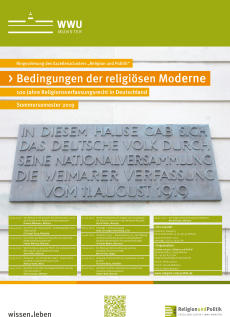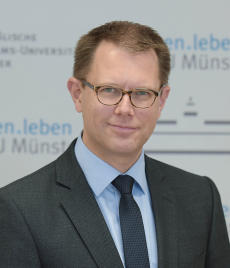“The constitutional law of religion is ready for the future – even after 100 years”
Münster legal scholar Hinnerk Wißmann: “The constitutional regulations of 1919 are a decidedly modern model and enable the integration of Islam, too” – New lecture series “100 years of the constitutional law of religion”, organized by the Cluster of Excellence “Religion and Politics”
Press release of the Cluster of Excellence from 26 March 2019

Even 100 years after the constitutional law of religion was adopted, legal scholars believe that it is still suitable for addressing new challenges such as the integration of Islam. “Although there is much greater religious diversity in Germany in 2019, the regulations of the Weimar Constitution of 1919 on the relationship between state and religion, which still apply today, will enable us to deal flexibly with the changed situation in the future as well”, says legal scholar Hinnerk Wißmann before the start of the new lecture series “Conditions of Religious Modernity. 100 Years of the Constitutional Law of Religion in Germany”, organized by the Cluster of Excellence “Religion and Politics” at the University of Münster. “The German constitutional law of religion has two particular features: the neutrality of the state (there has been no state church since 1919), and a broad understanding of religious freedom. It is a decidedly modern model: the state must maintain the same distance from all religious and ideological communities, while at the same time recognizing the importance of religion and promoting it”. This model can enable jurisprudence and politics to find regulations for current issues of dispute such as church labour law, religious education at school, and public holidays.
“Just as the constitutional law of religion in the early Federal Republic created conditions for a rapprochement between Catholics and Protestants, so legal practice is now required to offer Islam, which nobody had thought of in 1919, a fair place in society”, argues Hinnerk Wißmann, who is organizing the lecture series together with the legal scholars Oliver Lepsius and Fabian Wittreck. “We will take an interdisciplinary and internationally informed look at the legal toolkit: What works and what doesn’t, what are past and future challenges in the relationship between state and religion, what solutions can there be?” Wißmann will begin the series on Tuesday, 2 April, with the lecture “From Weimar to the Future: The turning-point of ‘1919’ as a constant of the constitutional law of religion”.
Do not overwhelm atheists with religion – Do not attempt to “churchify” Muslims
Non-religious people in Germany should not be “overwhelmed with religion”, according to Hinnerk Wißmann, who points to one example of this danger in North Rhine-Westphalia, where almost one-fifth of municipalities have exclusively Catholic denominational primary schools. “This is certainly not a model for the future. What is required is for people of all convictions to be offered something based on equal rights – because, in the words of the Federal Constitutional Court, the state is the ‘home to all citizens’”. The model “Religious education for all”, a cross-religious education, is currently being tested in Hamburg. Wißmann, who has recently published the book Religious education for all? On the contribution of the constitutional law of religion to pluralistic society, explains: “The model is highly controversial. But such efforts are necessary: in many regions of Germany, there are simply not enough pupils to justify a denominational religious education”.

It is also important, says Hinnerk Wißmann, to take into account the interests of Muslims: “Islam should not be forced to ‘churchify’. Our constitution guarantees religious freedom in all its diversity”. He considers the discussion about granting proper legal or “corporate” status to Muslim communities to be a largely unnecessary proxy discussion. “The state must organize cooperation with Islamic groups independently of it”. Church labour law is an important issue for the Christian churches, and how it develops over the next few years will depend to a large extent on the integration of European law into the EU. “The ECJ in Luxembourg is shaped by the French tradition and has little understanding for the German regulation. The European Court of Human Rights in Strasbourg, on the other hand, tends to be generous towards the legal peculiarities of the member states”.
The lecture series “Conditions of Religious Modernity. 100 Years of the Constitutional Law of Religion in Germany”, organized by the Cluster of Excellence “Religion and Politics” at the University of Münster, combines perspectives from constitutional law, history, theology, and the social sciences. In response to the constitutional anniversaries of 1919 and 1949, the scholars will examine the development of the constitutional law of religion in Germany from the Weimar Constitution of 1919 to the present day, and will also examine the situation in other countries such as France, Austria and the USA. The lectures will take place every Tuesday evening from 18.15 to 19.45 in the Juridicum lecture hall Jur 3, Universitätsstraße 14-16, in Münster. (sca/vvm)

